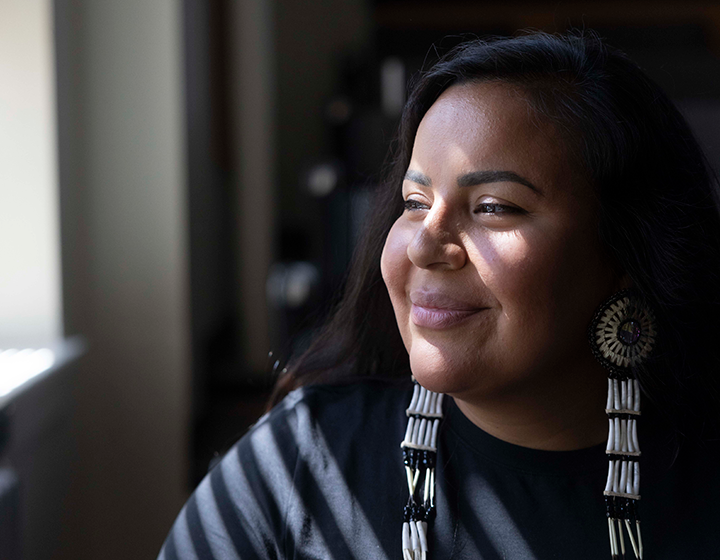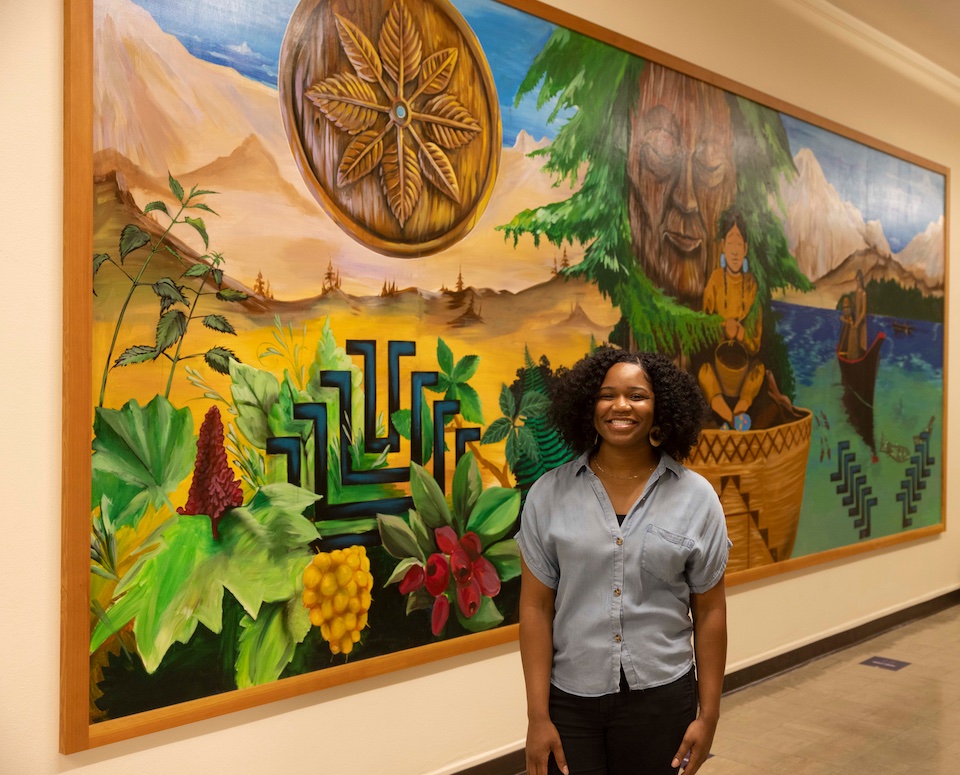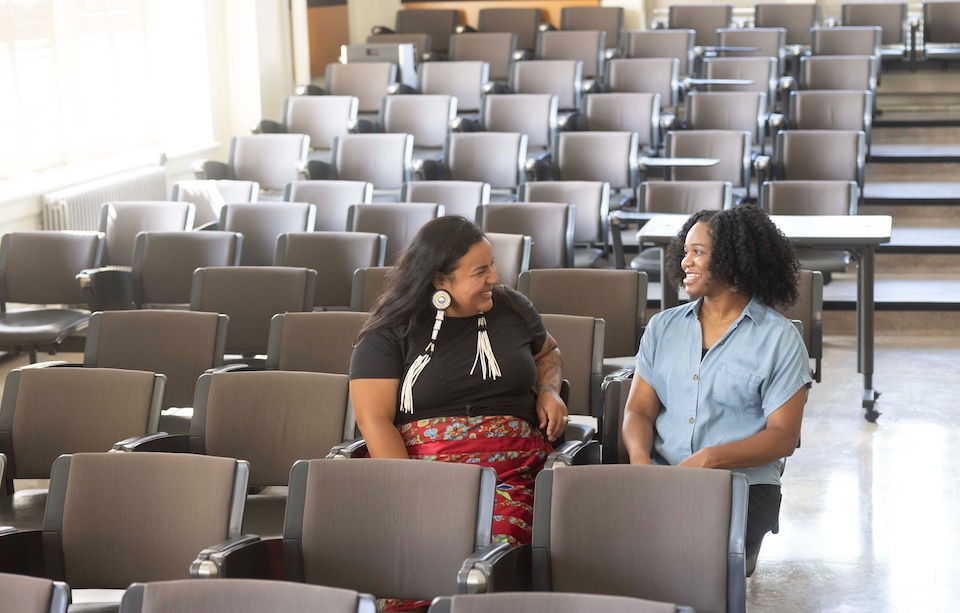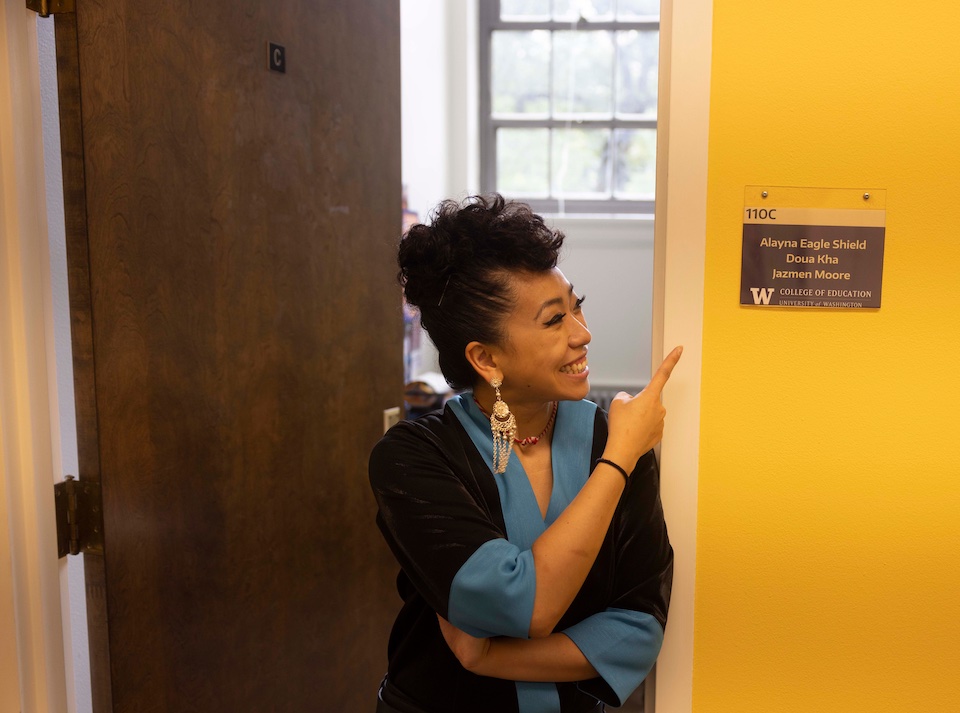Sitting at the Feet of the Elders: Building futures for the next generation

University of Washington’s Banks Center for Educational Justice research assistants Alayna Eagle Shield, Jazmen Moore and Doua Kha are anchored by their fierce dedication to their communities. They carry this dedication across their work as they seek to disrupt a society built on racism by centering healing and equity-driven scholarship that creates possibilities for a more just world.
The three women all came to do their doctoral work at the Banks Center because of its graduate program and a connection they made with its director, Dr. Django Paris.
"He's really doing nation-building work within and amongst other nations of community and people," says Eagle Shield. She would know.
“My great grandma was taken in a wagon to the Carlisle Indian School in Pennsylvania,” says Eagle Shield, a Standing Rock Sioux Tribe citizen, and mother of four. “She witnessed when Sitting Bull was killed."

Despite the dominant culture’s systematic and violent actions to exterminate and force assimilation on her people, Eagle Shield’s ancestors persevered through cultural wisdom and by continuing to seek connections.
"There was a leader in our community, Sitting Bull's nephew, One Bull,” Eagle Shield explains. “One Bull knew plants, animals, water ways and other tribes. He had a strong disposition, firm foundation of Lakota language, values and morals.” Her father, John Eagle Shield, a knowledge keeper and leader in their community, valued and emulated One Bull’s worldview and ability to make relatives wherever he went, and passed those values on to the young people in his life, especially his own children.
As she grew up, found her life partner, and eventually had children, Eagle Shield lived on the reservation, learned from the teachings passed down from her great grandmother to her father, and continued the work of keeping her culture and language alive. She enrolled her children in a Lakota immersion school.
“In my search to further my education and enact the teachings of Lala (grandpa) One Bull,” she says, “my dad encouraged me to travel the world and make lots of relatives along the way.”
We’re All Related
In 2016, the world came to Eagle Shield’s doorstep as she joined the water is life movement when the pipeline was being built north of the Standing Rock Reservation. That’s where she met Rae Paris, a UW associate professor of creative writing and Banks Center affiliate faculty member, and Banks Center director Django Paris. Eventually, they would encourage her to apply to the Banks Center’s program.
Up until then, Eagle Shield knew little about Black communities or other communities outside of her own people. Fellow doctoral students Kha and Moore would be among new members of Eagle Shield’s chosen family, coming to the program with their own wisdom and drive for connection.
I was searching for community, a mentor, a village, not just an advisor, and I found it.
"I'm the first in my family to go to graduate school," says Kha. "Because of my interests in organizing with queer and trans Hmong youth, Django reached out personally. He said, ‘I think you’d be an amazing fit for this program, and I want to support you on this journey.’” That was the first time a faculty member that Kha didn’t know had validated her as a person and a scholar. "I was searching for community, a mentor, a village, not just an advisor, and I found it."
Moore experienced that kind of support as an undergraduate at Michigan State University when she took a creative writing class with Rae Paris. "She saw me and what I was trying to write about Black girls and women, silence and navigating traumatic experiences," says Moore. "She became a mentor and believed in me becoming an educator. Because my work aligned with her husband’s work, she connected me to Django early on." Their mentorship would eventually lead Moore to the University of Washington.
In the Beginning

Originally founded by James Banks in the 1990’s as the Center for Multicultural Education, the Banks Center opened its doors in 2018. The Banks Center’s origin story intertwines with the stories of Eagle Shield, Moore and Kha.
Since opening and even and especially during a global pandemic, its director, programs, faculty, and undergraduate and graduate students are continually evolving and influencing one another and the wider world. Examples of this work-in-progress include the Tulalip Culturally Sustaining Education Project, the Distinguished Summer Scholars and Artists series and the Black Student and Faculty Mentoring Collaborative.
"What we've been trying to do in the Banks Center's work and across these three projects is to join the work of Black and Indigenous communities," says Paris. "That includes families, tribes, neighborhoods, the land, from the youngest to elders, artists, scholars, to join folks in understanding the connection between the past work and the work in front of us."
What we've been trying to do in the Banks Center's work and across these three projects is to join the work of Black and Indigenous communities.
After beginning in the winter of 2020, the Tulalip Culturally Sustaining Education Project shifted from in-person to online during the COVID-19 pandemic. The work involves learning alongside the culturally sustaining educational work of partners Chelsea Craig, the assistant principal at Quil Ceda Tulalip Elementary and a Leadership for Learning doctoral student, and Dr. Anthony Craig, an affiliate faculty member at the Banks Center and the Leadership for Learning director.
“Even working remotely, one of my favorite things is being in community and seeing how family can be an amazing support system," says Kha.
This healing work of resistance and sustenance the Tulalip people have forged in and beyond educational settings also resonates for Moore. "We have been learning how they have sustained Tulalip lifeways over time," she says. "As an educator, I see Chelsea navigating her position as an administrator of a local elementary school, and I think about the harm done in our state-sanctioned schools and ask, are they redeemable and how do we sustain our young people within schools in the meantime?”
The answers do not come from any one person. "They are teaching the children, and the children are teaching them," says Kha. "They've also invited the elders. I've been fortunate enough to be in the presence of Grandma Patti (Patti Gobin), hear the stories of her struggles, and see she still has hope for the current and future generations to reclaim what they've lost."

More than hope is the promise of combined intergenerational vision and wisdom. “I've always loved sitting at the feet of the elders and learning,” Kha says. “It's even more powerful when elders are willing to sit at the feet of young people and recognize that they aren't just future leaders but are leaders now."
The Distinguished Summer Scholars Program offers another way for students to experience new and inspiring perspectives and potential pathways. "It's always exciting to learn who is coming," says Moore. "The first summer of 2019, the course with Sandy Grande and Leslie Williams was pivotal in my whole graduate trajectory. The second summer with Alexis Pauline Gumbs, I learned about practice versus performance. Schools want students to perform and show up in neat narrow boxes, but what happens when you stop performing and start cultivating a practice for living and being?"
Schools want students to perform and show up in neat narrow boxes, but what happens when you stop performing and start cultivating a practice for living and being?
"Django does an amazing job of finding people doing liberating work and challenging norms," says Kha. "In 2020, when everything was online, the course reminded students, Black, Indigenous, and students of color, that writing doesn't have to be for others. It can be for you and your community. The best thing was that it challenged you to find yourself in community and center that."
"I'm a huge fan of the summer series," says Eagle Shield. "I had no idea what to expect. When I started my Ph.D. program in 2019, I did a summer class first. The Black and Indigenous Theories of Education Liberation and Resurgence course was the most beautiful opening class I had ever taken. It set the bar for what could be. There was a peeling and healing that I had to do. I hope the series continues forever."
In its first year, the Black Student and Faculty Mentoring Collaborative gives an additional avenue for collective growth under the leadership of Rae and Django Paris and with support from the UW Black Opportunity Fund.
"We spent this year moving with care and compassion," says Moore. "We're still in a pandemic, and people are still carrying a lot." She describes how they partnered with undergraduate student Navon Morgan (director of the UW Black Student Commission) to identify interested undergraduate students and paired them with faculty members.
The stipends and honorariums went toward different projects, artistic processes and professional development work. "We gave people a wide berth in how they wanted to spend their time in the pairings, and people are still sharing what took place. It will be great to see where we take it next year," she says.
Toward a Shared Destination

These Banks Center efforts also inform and intersect with individual student scholarship. In the case of Moore, her dissertation grew out of a preliminary research study she conducted in 2020 related to a park project that enlisted local teens, all Black girls, to help advocate for it being rebuilt. Since then, the teens have claimed the park project’s Teen Advisory Team and the relationships they have built with each other as a place of liberation and healing. Starting in 2021, Moore has been learning and working with some of these same teens on her dissertation. The study explores how the refusals and participation in chosen, consent-based learning spaces by Black girls disrupts systemic anti-Black racism within the context of U.S. schools.
Because of her research, Moore was recently awarded a National Academy of Education Spencer Foundation Dissertation Fellowship as part of the 2022 cohort of scholars developing new knowledge to support policy, practice and public engagement.
She describes what she witnessed in the park project teen advisory team meetings and how that influenced her thinking. “The girls talked about their experience in their local high schools, where most students are white,” says Moore. “School felt unwelcoming, and they were unpacking. In my research, I'm thinking about chosen learning spaces, consent-based learning, Black and Indigenous theories of consent and refusal, enacting refusals or advocating for something different, and that's a big shift from where I started."
Kha, a Gates Millennium Scholar (GMS) who served as the outreach coordinator from 2017 to 2020 for the GMS Alumni LGBTQ+ Network, doing national advocacy and programming work, is looking into traditional K-12 spaces where queer and trans Hmong youth lead the way. "I used to look at these students in a deficit way," she says. "The Banks Center has challenged me to look at things differently. After seeing how other communities are taking up space and passing down traditions, I'm seeing when these students are doing liberator’s work, rebelling and organizing. It's changed how I see myself too."
Eagle Shield also describes a transformative journey. After getting invited to the American Education Research Association annual meeting to receive an award, she asked Paris for guidance. "I was so nervous after the camp in opposition to the pipeline closed. I had never been an academic,” she says. "He said to do what feels right, that I was part of this movement." Ideas shared at the conference would later result in her collaboration on the published book, Protecting the Promise: Indigenous Education Between Mothers and Their Children.
While there, Eagle Shield also had a realization. “One of the things that came to me at the AERA session was that Native and Black peoples need to become relatives again," she says.
In this moment of pandemic and climate catastrophe and emboldened white supremacy, we are among the communities and voices needed to enact a possible future for all people.
This coming together is at the heart of the Banks Center’s work of joining the leadership of Black, Indigenous, Latinx, Asian, and Pacific Islander communities. Paris describes it like this, "In this moment of pandemic and climate catastrophe and emboldened white supremacy, we are among the communities and voices needed to enact a possible future for all people."
He acknowledges that while it may sound like a grand statement, it's happening. "It's time for society, including institutions of higher ed and pre-k-12 schools to follow this leadership as we research, teach and learn together. The answers are in our communities."
